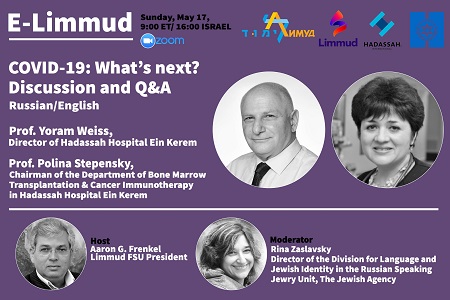
Hadassah International’s first webinar in both Russian and English was hosted by E-Limmud and chaired by Aaron G. Frenkel, Limmud FSU President. The webinar featured Prof. Yoram Weiss, Director of Hadassah Hospital Ein Kerem, and Prof. Polina Stepensky, Chairman of the Department of Bone Marrow Transplantation and Cancer Immunotherapy in Hadassah Hospital Ein Kerem.
500 participants from all over the world participated, joining in from Australia, South America, the US and Europe, as well as a very large contingent from Russia.
Prof. Weiss was asked by the webinar host to address the questions “Where are we now with the Coronavirus, where have we been, and where are we going?”
Prof. Weiss responded that probably the most important initial decision made by the Hadassah Hospitals was to separate COVID-19 patients from regular patients. From the beginning of the pandemic, Hadassah separated all coronavirus patients into a separate building redesigned specifically to treat these patients in isolation from the rest of the hospital. This created a parallel duplicate structure to optimize the treatment of these patients, while leaving the rest of the hospital free of the coronavirus and available to treat everyone else.
Prof. Weiss stated that Hadassah has concluded that there will probably not be a cure for COVID-19 for 1.5 to 2 years, and we will have to live with the virus in our midst. It is extremely important that all patients feel comfortable coming to a hospital for their regular health care. For example, of the over 1000 patients that came to Hadassah through the Biological Emergency Room with respiratory problems during the past 2-3 months, only 88 actually tested positive for COVID-19.
Addressing other important steps Hadassah has initiated during the pandemic, he stressed that regular testing for staff proved to be vital and has now been adopted by all hospitals in Israel. Also, there was no shortage of personal protective equipment (PPE), and everyone, including authorized visitors, were issued masks and other needed protective gear.
Telemedicine is also very important. Control screens that enable the staff to monitor the activity in the Hadassah coronavirus isolation wards, and issuing every patient with electronic monitoring equipment, has meant that the staff could treat their patients while remaining protected.
Hadassah management works with the staff at all times, finding solutions as problems arise. This has resulted in very high moral among the staff, who in turn have gone out of their way to lift the spirit of the patients through thoughtful kindness and caring.
Hadassah also instituted extensive lab testing for the coronavirus. Hadassah has the leading RT-PRC testing laboratory in Israel. Hadassah has also been collecting serum with a high number of antibodies from COVID-19 survivors to use in treating some patients.
Hadassah is involved in research on re-purposing some drugs that show promise of ameliorating the disease, as well as research on different ways of providing oxygen to patients. These include a new inexpensive Bag-Valve-Mask (BVM) respirator for those who need it to survive COVID-19. Hadassah has also worked with SodaStream to produce the “Stream02”, a new high flow oxygen devise.
Prof. Weiss concluded that “Until such time as there is a cure for COVID-19, all hospitals will have to return to treating regular patients at the same time as they treat COVID-19 patients. It will be important to keep both populations safe. At the same time, it is very important that we continue social distancing.”
Prof. Polina Stepensky spoke in Russian about Hadassah’s research project to develop an enriched serum containing Virus Specific T-cells (VST) from patients who have recovered from COVID-19. Hadassah hopes to develop an “off the shelf” product that will be effective for COVID-19 patients.
She explained how the SARS-CoV-2 virus attacks the body and how the body tries to defend itself with antibodies. Serum containing these antibodies is now being collected from recovered patients. It can be used as a treatment for acute viral sepsis in some patients who are in the hyper-inflammation phase of COVID-19 to help regulate their immune reaction. It can also be used to try to develop an “off the shelf” VST product.
Jorge Diener, Associate Director of Hadassah International, brought the “Hadassah Manual of Protocols for COVID-19 to the attention of the audience.” This manual is available in Russian, as well as English and Spanish.
See more of the questions and answers addressed in the webinar.
